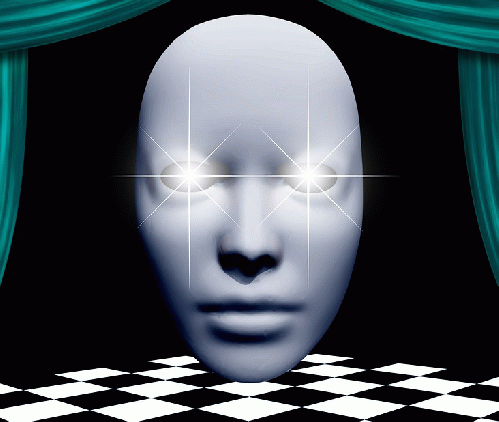One way to diminish our suffering is to become
conscious of when our eyes go looking for something that upsets us. Another way
is to be watchful of what our imagination is up to.
Just as sponges can soak up dirty water as easily as
clean water, our eyes can also take in impressions from the world around us
that leak misery into our soul. We like to think we use our visual faculty in
pursuit of pleasure, but we also use it to entertain old hurts, grievances, and
longings. Our eyes go looking for pleasure and stimulation--but also needlessly for
ways to suffer.
Groucho Marx famously asked, "Who are you going to
believe, me or your own eyes?" The drollery is delightful, yet our eyes are
suspect nonetheless. Our eyes, along with our imagination, quite readily go
searching for things to worry and brood about. Through our eyes and
imagination, we can be tempted to look for sights or impressions that stir up
within us negative emotions relating to deprivation, refusal, helplessness,
rejection, and unworthiness.
The writer Johann Wolfgang von Goethe once said, "The
hardest thing to see is what is in front of your eyes." He meant, of course,
that we're emotionally blocked from seeing objectively. Often we're determined to
see what we want to believe. Typically, we're eager to believe what's
irrational or false when doing so safeguards our resistance, denial,
projections, and illusions. While we unwittingly block out gleanings of truth
and reality, we also allow, unimpeded into our minds, subjective perceptions
that stir up negative emotions that have remained unresolved in our psyche.
Meanwhile, we also possess an imagination that, in our
mind's eye, can conjure up images and visualizations that dress up our inner
life with speculative fears, negative propositions, and gruesome considerations.
To avoid unnecessary suffering, we need to be more
conscious of our visual capacity (termed the visual drive in psychoanalysis) in order to regulate it. We want to
be able to monitor ourselves so that we can correlate our negative feelings at
any given moment with the related visual impressions we're absorbing or the
imaginative musings we're producing. In this way, we catch ourselves dipping
into negative emotions for no other purpose than to suffer.
When we look at a beautiful object, we naturally want
to feel some pleasure. Instead, we could in that moment be feeling deprived of
the object and envious of those who own it. Or we could be creating reasons in
our mind to belittle the object. In doing this, we're using our eyes to deepen
the hurt of feeling deprived or to wallow in the feeling of being a lesser
person because we don't possess the object.
Orlando says in Shakespeare's As You Like It: "But Oh, how bitter a thing it is to look into
happiness through another man's eyes." Indeed the negative feeling of envy is a
bitter one. A deeper emotion, however, is at play. This is our emotional
entanglement in deprivation, a leftover effect from the oral stage of childhood
and the driving force behind consumerism. Deep memories of deprivation--and
unresolved resonance with that feeling--make us frantic consumers at the SuperMart
of materialism, loading our shopping-carts with what we're determined to believe
are the basic essentials of the good life.
Remarkably, most people aren't conscious of the inner
mechanism through which they create this suffering. To understand this inner operation,
we have to develop some awareness of how, deep in our psyche, we're holding on
to unresolved emotions. That awareness grows as we see how and why we misuse
our visual drive.
We move about our environment with famished eyes, pawns
of our psyche's determination to feel marginalized, disrespected, unfairly
treated, and deprived. We don't do this all the time, of course. The tendency
comes and goes, but it can be excruciating painful when it does come upon us.
There's a quaint, rather comic term from
psychoanalysis--negative peeping--that
identifies our tendency to absorb visually that which induces a negative
reaction within us. When people look into the world, they're often "peeping" to
see how others are indifferent to their existence. Or they're looking around to
see how they can feel superior to others. Racists do this for the unconscious
purpose of cozying up to unresolved feelings of inferiority within themselves. A
hoarder creates mounds of clutter and then peeps at it in dismay, stirring up
unresolved feeling of being helpless and overwhelmed by it all. A youngster can
be peeping when she watches closely to see whether her brothers or sisters are
getting more attention and love than she believes she gets from Mom and Dad.
The other related misuse of the visual drive involves
our imagination, and here the same principles apply. Now we're seeing images
and visualizations with our inner eye. Writers, artists, scientists,
entertainers, and others use their imagination to create dramatic effects,
useful products, or beautiful objects. We can all use our imagination wisely to
produce pleasant thoughts and feelings. But many of us (worriers, for instance)
produce images of bad things happening because of our unresolved affinity for
feeling overwhelmed and helpless in the face of challenges or calamity. As
well, painful feelings of fear, along with unresolved emotional attachments to
feeling dominated or overpowered, are often behind the misuse of the
imagination.
French novelist Marcel Proust was right when he wrote,
"The real voyage of discovery consists not in seeking new landscapes, but in
having new eyes." New eyes refer, of course, to the consciousness behind the
eyes. English poet William Blake immortalized this point when he wrote, "This
life's dim windows of the soul / Distorts the heavens from pole to pole / And
leads you to believe a lie / When you see with, not through, the eye."





